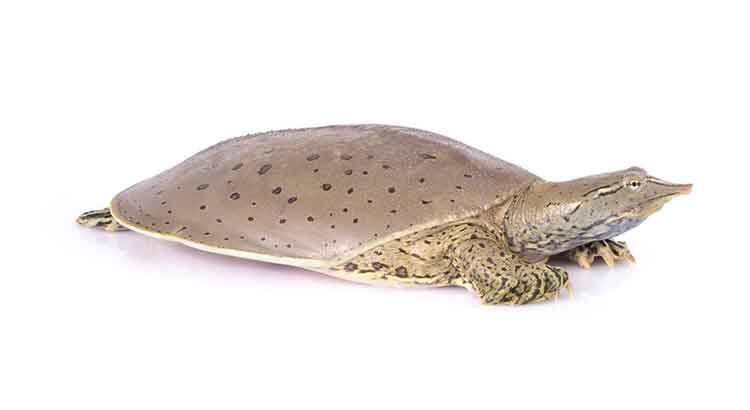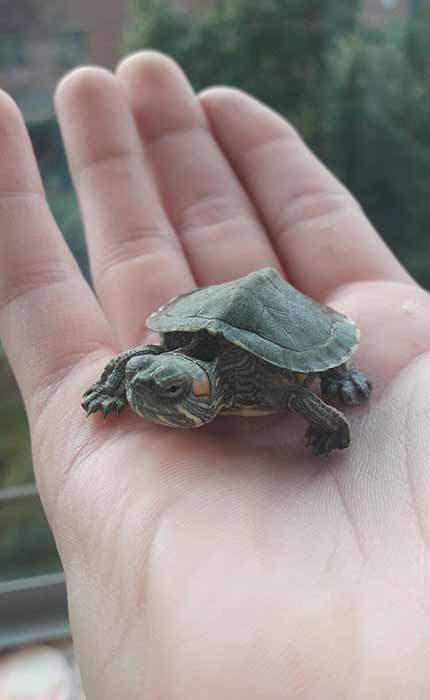Softshell turtles are a common sight in many water bodies, especially in North America. These turtles are known for their unique appearance, with their soft, leathery shells and long snouts. While they may seem harmless and even cute, many people wonder if softshell turtles are dangerous. In this article, we’ll explore this question in-depth and provide you with the information you need to stay safe around these animals.
Softshell turtles are not dangerous, but they can become aggressive if they feel threatened. Other dangers associated with softball turtles are those of the bacteria that are usually found on their body.
Under normal circumstances, you won’t see a softshell turtle chasing somebody to bite them, they only become aggressive if they feel threatened. But what can make them feel threatened can vary.
Are Softshell Turtles Aggressive?
Firstly, it’s essential to understand that softshell turtles are not aggressive animals. They do not actively seek out human interaction, nor do they attack humans for no reason. These turtles are primarily carnivorous and feed on fish, frogs, and other small aquatic animals. As such, they pose no direct threat to humans. In fact, many people keep softshell turtles as pets, and they can be friendly and sociable animals.
However, there are a few things to keep in mind when it comes to softshell turtles and potential risks. Firstly, while softshell turtles are not aggressive, they can still bite if provoked or threatened. Like all animals, softshell turtles have a natural instinct to defend themselves if they feel threatened or endangered. If you approach a softshell turtle too closely or handle it inappropriately, it may bite you. These bites can be painful and can potentially transmit bacteria, so it’s best to avoid handling softshell turtles unless you are trained and know what you’re doing.
As for what can make a softshell turtle feel threatened, it can vary, but in general loud sounds, strong lights (like the flash from a phone), sudden movements, and getting too close.
While all softshell turtles have a slightly different personality, and some can feel threatened just by your simple presence, while others can ignore you completely. It’s important to keep a safe distance, as softshell turtles won’t try to bite you if you keep your distance.
Softshell Bacteria
Another potential risk associated with softshell turtles is their ability to carry and transmit disease. Like all animals, softshell turtles can carry bacteria, viruses, and other pathogens that can cause illness in humans. Salmonella is a particular concern with softshell turtles, as they can carry these bacteria without showing any symptoms. If you handle a softshell turtle and then touch your mouth or face without washing your hands, you could potentially ingest salmonella bacteria and become ill. As such, it’s crucial to wash your hands thoroughly after handling softshell turtles, especially if you plan to handle food or eat.
Not All Softshell Turtles Are the Same
Softshell turtles are a diverse group of reptiles that includes numerous species with varying characteristics and behaviors. Some softshell turtles are small and relatively harmless, while others are much larger and more aggressive.
One example of a softshell turtle that can be potentially dangerous is the Florida softshell turtle (Apalone ferox). This species can grow up to 2 feet in length and has a long, flexible neck that it can use to deliver a powerful bite. Florida softshell turtles are also known to be territorial and can be aggressive towards humans, other turtles and even larger animals such as alligators.
Another example of a softshell turtle that can be dangerous is the Indian flapshell turtle (Lissemys punctata). This species can grow up to 17 inches in length and has a powerful bite that it can use to defend itself. Indian flapshell turtles are also known to be aggressive and will attack other turtles, including larger species, to defend their territory.
Despite the potential danger posed by some species of softshell turtles, it is important to remember that these animals are not aggressive towards humans unless they feel threatened or cornered. In most cases, softshell turtles will simply try to avoid humans and will not attack unless they are provoked.
Handling a Softshell Turtle
In terms of handling softshell turtles, it is generally best to avoid touching them or picking them up. Softshell turtles can be surprisingly strong and can deliver a powerful bite or scratch if they feel threatened or are mishandled. If you do need to handle a softshell turtle for research or other purposes, it is important to wear protective gloves and handle the animal gently to avoid injuring it or yourself.
About Softshell Turtles
Softshell turtles are fascinating creatures with a range of interesting adaptations that have helped them survive for millions of years. One such adaptation is their unique, flexible shell, which allows them to move quickly and easily through water and mud. Softshell turtles are also known for their long, flexible necks, which they can use to snatch prey and defend themselves from predators.
Softshell turtles are found in a variety of freshwater habitats around the world, from slow-moving rivers and streams to lakes and ponds. They are typically active during the day and will bask in the sun on rocks or logs to regulate their body temperature. Softshell turtles are also capable of breathing air and can stay underwater for extended periods of time by absorbing oxygen through their skin.
One of the most interesting aspects of softshell turtle behavior is their reproductive strategies. Softshell turtles are known for their unique courtship rituals, which can involve vocalizations, displays, and even aggression between males. Female softshell turtles will typically lay their eggs in shallow nests dug into sand or mud, where they will hatch after a period of incubation.
Softshell turtles play an important role in freshwater ecosystems, both as predators and prey. These turtles feed on a variety of aquatic prey, including fish, crustaceans, and insects, and can help control populations of these animals in their habitats. At the same time, softshell turtles are also preyed upon by a variety of predators, including birds, mammals, and larger reptiles such as alligators.
In terms of conservation, many species of softshell turtles are threatened by habitat loss and degradation, as well as overexploitation for food, traditional medicine, and the pet trade. Some softshell turtle species have also been impacted by introduced predators and the spread of invasive species in their habitats. As a result, many conservation organizations are working to protect and conserve softshell turtle populations around the world.
Final Thoughts
Overall, softshell turtles are not dangerous to humans, but they should still be treated with respect and caution. These fascinating reptiles are important members of freshwater ecosystems and play a vital role in maintaining the balance and health of these environments. By observing softshell turtles from a safe distance and avoiding handling or touching them, we can appreciate these remarkable creatures while also ensuring our own safety and the preservation of their habitats.


